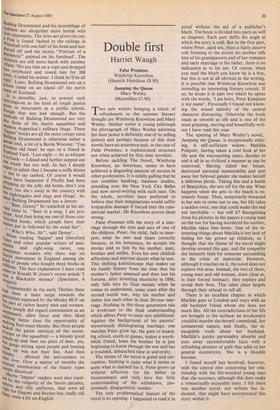Double first
Harriet Waugh
False Premises Winthrop Knowlton (Hamish Hamilton £8.95) Jumping the Queue Mary Wesley (Macmillan £7.95)
Two new writers bringing a touch of refreshment to the summer literary drought are Winthrop Knowlton and Mary Wesley. Neither writer is young (although the photograph of Mary Wesley adorning her dust jacket is definitely one of its selling points) and perhaps because of this their novels have an assurance and, in the case of False Premises, a sophisticated structure not often achieved by first time novelists.
Before tackling The Novel, Winthrop Knowlton, an American, seems to have achieved a disgusting amount of success in other professions. It is mildly galling that he can combine banking, business studies, presiding over the New York City Ballet and now novel-writing with such ease. On the whole, novelists have preferred to believe that their imaginations would suffer irreparable damage if forced into the com- mercial market. Mr Knowlton proves them wrong.
False Premises tells the story of a mar- riage through the eyes and ears of one of the children. Peter, the child, fails to inter- pret, what he sees and hears correctly because, in his innocence, he accepts the stories told to him by his mother, aunt, brother and uncles. Even his own childish affections and mistrust distort what he sees. This shifting kaleidoscope that makes up his family history from the time that his mother's father amassed and then lost his fortune, after inventing electricity in 1886, only falls into its final mosaic when he comes to understand, some years after the second world war, why his mother and father lost each other in their 20-year mar- riage. Nothing in this three generation tale is irrelevant to the final understanding which allows Peter to enter into adulthood. Against the background of his parents' mysteriously disintcgrating marriage, one watches Peter grow up. He goes to board- ing school, excels at games, makes a worth- while friend, loses the brother he is just beginning to know through the war and has a troubled, debauched time at university.
The theme of the novel is greed and cor- ruption. Nothing is quite what it seems or quite what is claimed for it. Peter grows up without affection for his father (a businessman) and with love but little understanding of his withdrawn, pas- sionately, disappointed mother.
The only problematical feature of the novel is its opening. I happened to read it in
proof without the aid of a publisher's blurb. The book is divided into parts as well as chapters. Each part shifts the angle at which the story is told. But in the first part, where Peter, aged ten, plays a fairly passive role listening to the stories his mother tells him of his grandparents and of her romance and early marriage to his father, there is no indication as to his sex, Of course, when you read the blurb you know he is a boy, but this is not at all obvious in the writing. It is possible that Winthrop Knowlton was intending an interesting literary conceit. If so, he drops it in part two which he opens with the words, 'I am born, Peter Kempton is my name'. Personally I found not know- ing the sexual identity of the central character distracting. Otherwise the book reads as smooth as silk and is one of the most gripping, moving and beautifully writ- ten I have read this year.
The opening of Mary Wesley's novel, Jumping the Queue, is exceptionally entic- ing. A self-sufficient widow, Matilda Poliport, having taken a cool look at her life and the encroaching years, decides to end it all in as civilised a manner as can be contrived. Having tidied her house, destroyed personal memorabilia and sent away her beloved gander she makes herself a delicious picnic. Taking this and a bottle of Beaujolais, she sets off for the sea. What happens when she gets to the beach is ex- tremely funny. Then, temporarily thwarted in her aim to swim out to sea, her life takes a sudden twist, one that could make the end not inevitable — but will it? Recognising from his pictures in the papers a young man on the run for having murdered his mother, Matilda takes him home. One of the in- teresting things about Matilda is her lack of feeling for her grown up children, so I thought that the theme of the novel might develop around this gap, and the sympathy she instantly feels for someone succumbing to the crime of matricide. However, although it touches on it, the novel does not explore this area. Instead, the two of them, young man and old woman, draw close as, in their forced intimacy, they explore and reveal their lives. This takes place largely through their refusal to tell all.
There is an excellent chapter in which Matilda goes to London and stays with an old bachelor friend whom she does not much like. All the contradictions of her life are brought to the surface: an involuntary youthful murder she herself committed, her unmaternal nature, and finally, the in- escapable truth about her husband. Matilda's quirky personality absorbs and puts away uncomfortable facts with a refreshing absence of guilt that adds to her general eccentricity. She is a likeable heroine.
I found myself less involved, however, with the central plot concerning her rela- tionship with the life-wrecked young man that she succours, although this does make a romantically enjoyable story. I felt there was another novel, not written but in- dicated, that might have incorporated this story within it.


































 Previous page
Previous page